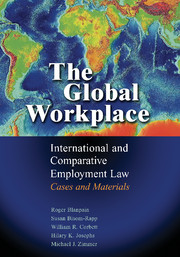Book contents
- Frontmatter
- Contents
- Acknowledgments
- Table of Cases
- Table of Statutes
- Table of Secondary Authorities
- 1 The Study of International and Comparative Employment Law
- 2 The International Labour Organization and International Labor Standards
- 3 The United States
- 4 Canada
- 5 Mexico
- 6 The Regulatory Approach of the North American Free Trade Agreement
- 7 The European Union
- 8 The United Kingdom
- 9 Germany
- 10 France
- 11 China
- 12 Japan
- 13 India
- 14 Pursuing International Labor Standards in U.S. Courts and Through Global Codes of Conduct
- Index
1 - The Study of International and Comparative Employment Law
Published online by Cambridge University Press: 05 June 2012
- Frontmatter
- Contents
- Acknowledgments
- Table of Cases
- Table of Statutes
- Table of Secondary Authorities
- 1 The Study of International and Comparative Employment Law
- 2 The International Labour Organization and International Labor Standards
- 3 The United States
- 4 Canada
- 5 Mexico
- 6 The Regulatory Approach of the North American Free Trade Agreement
- 7 The European Union
- 8 The United Kingdom
- 9 Germany
- 10 France
- 11 China
- 12 Japan
- 13 India
- 14 Pursuing International Labor Standards in U.S. Courts and Through Global Codes of Conduct
- Index
Summary
[C]oming out of nowhere, international labor law has grabbed the attention of globalizing multinationals, the international labor movement, activists, newspapers, governments, and non-governmental diplomatic organizations (NGOs) the world over. In the process, international employment law morphed from an arcane backwater into a tinderbox that (quite literally) ignites violence in the world's streets. Today, it is little wonder that the outlook is indeed rosy for international employment law practitioners.
Donald C. Dowling, Jr., The Practice of International Labor and Employment Law: Escort your Labor/Employment Clients into the Global Millennium, 17 Lab. Law. 1, 3 (2001).INTRODUCTION
Imagine that you are an employment lawyer whose firm represents transnational corporations. Your client, a U.S. manufacturer of medical devices, plans to issue stock options to its executives. In return for the options, the client wants executives located in twenty-two national jurisdictions to sign covenants not to compete that will prevent them from working for the client's competitors for a certain period of time after their departure from the company.
Think about the ways in which this assignment is challenging. Noncompete agreements are devices increasingly used domestically by U.S. employers to prevent former employees from using the human capital they develop on the job on behalf of a competitor. In the United States, employers sometimes enforce these agreements by filing suit seeking to enjoin the postemployment activities of former employees.
- Type
- Chapter
- Information
- The Global WorkplaceInternational and Comparative Employment Law - Cases and Materials, pp. 1 - 52Publisher: Cambridge University PressPrint publication year: 2007
- 1
- Cited by

